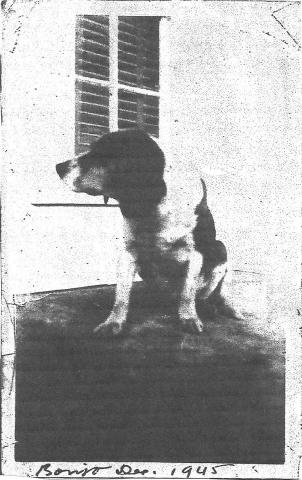Banjo
There was an old song that went like this: “B-I-N-G-O! B-I-N-G-O! And Bingo was his name-o!” But our dog was named B-A-N-J-O. Banjo was his name-o. Dad had a dog named Banjo when he was a boy and wanted us to have one, too. I was only five when Dad brought home the beagle puppy in 1934.
Mother was upset. “We can hardly feed ourselves. How can we feed a dog?” Dad explained that beagles were a hunting breed. Banjo would flush out rabbits to where he could shoot them. “We all like fried rabbit,” Dad reminded her. Mother gave in. The puppy had a home. He was to be a well-traveled beagle.
The next argument came when Mother asked, “Who gave him to you?” Dad hemmed and hawed before admitting he had traded a bushel of potatoes for the pure breed beagle puppy. “We needed those potatoes for winter,” Mother reminded Dad.
Pure breed my eye! As Banjo thrived and grew, he quickly passed the standard beagle size. He was more the size of a blue tick hound. He looked like a beagle, only bigger. Feeding Banjo was no problem. He ate everything, even chicken bones.
As a hunter Banjo left much to be desired. Dad tried in vain to train him. Banjo's strong point was being a companion to my brothers and me. He was good at hanging out, not hunting. You can't make a hunting dog out of a pet. Mother soon forgot her resentment and accepted him into our family.
We then moved to town. Banjo went with us. He accompanied us on our many moves in the next few years. He quickly adapted to each new situation. Since he was not a hunter and hanging out was his area of expertise, adaptation was easy. Banjo was the security blanket we needed as we traveled to unknown places. Everything was all right with Banjo there.
Banjo was a creature of comfort. He usually slept on a gunny sack on the porch. It was to be no different at our last farm home. There was a refinement to his laying down technique. Banjo would circle the gunny sack two or three times and when he finally landed his butt would be on the sack, leaving his head on the hard, cold, cement floor. Banjo's most valued end was his rear end, or so it seemed.
By this time in 1945, Banjo was old. Nearly blind, his demise came when he sensed a female dog walking down the road. Banjo rose to his feet and hobbled toward the rendezvous he hoped to have. His tryst was aborted by a speeding car. Banjo died there in the road. We all cried, even Mother. Our family had lost our best friend.
- Log in to post comments
